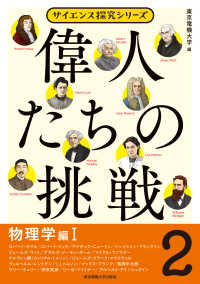- ホーム
- > 洋書
- > 英文書
- > Literary Criticism
Full Description
The second phase of the civil rights movement (1965-1973) was a pivotal period in the development of ethnic groups in the United States. In the years since then, new generations have asked new questions to cast light on this watershed era. No longer is it productive to consider only the differences between ethnic groups; we must also study them in relation to one another and to U.S. mainstream society.
In "Shakin' Up" Race and Gender, Marta E. SÁnchez creates an intercultural frame to study the historical and cultural connections among Puerto Ricans, African Americans, and Chicanos/as since the 1960s. Her frame opens up the black/white binary that dominated the 1960s and 1970s. It reveals the hidden yet real ties that connected ethnics of color and "white" ethnics in a shared intercultural history. By using key literary works published during this time, SÁnchez reassesses and refutes the unflattering portrayals of ethnics by three leading intellectuals (Octavio Paz, Daniel Patrick Moynihan, and Oscar Lewis) who wrote about Chicanos, African Americans, and Puerto Ricans. She links their implicit misogyny to the trope of La Malinche from Chicano culture and shows how specific characteristics of this trope-enslavement, alleged betrayal, and cultural negotiation-are also present in African American and Puerto Rican cultures. SÁnchez employs the trope to restore the agency denied to these groups. Intercultural contact-encounters between peoples of distinct ethnic groups-is the theme of this book.
Contents
Agradecimientos
Prelude
Introduction: Intercultural Connections
Chapter 1. "In Bed" with La Malinche: Stories of "Family" À la Octavio Paz, Daniel Patrick Moynihan, and Oscar Lewis
Chapter 2. La Malinche at the Intersection of Puerto Rican and African American Cultures: Piri Thomas and Down These Mean Streets
Interlude 2. La Malinche: Shuffling the Puerto Rican Border in Spanish and Black Harlem
Chapter 3. Of Nutshells, Frogs, and Men in Manchild in the Promised Land
Interlude 3. Grandma Knows Best: The Women in Manchild in the Promised Land
Chapter 4. Overcoming Self-Loathing, Learning to Love Brownness: Oscar Zeta Acosta and The Autobiography of a Brown Buffalo
Interlude 4. The Brown Buffalo Puts On Blackface
Epilogue: La Malinche Comes Home
Notes
Bibliography
Copyright Acknowledgments
Index







